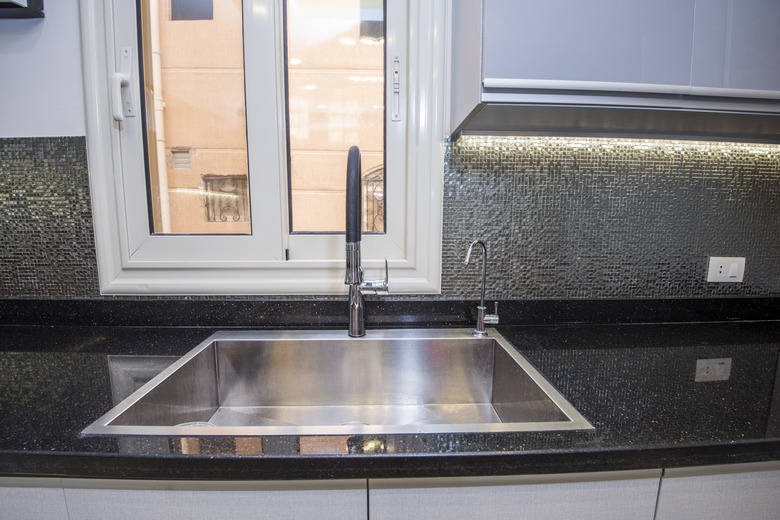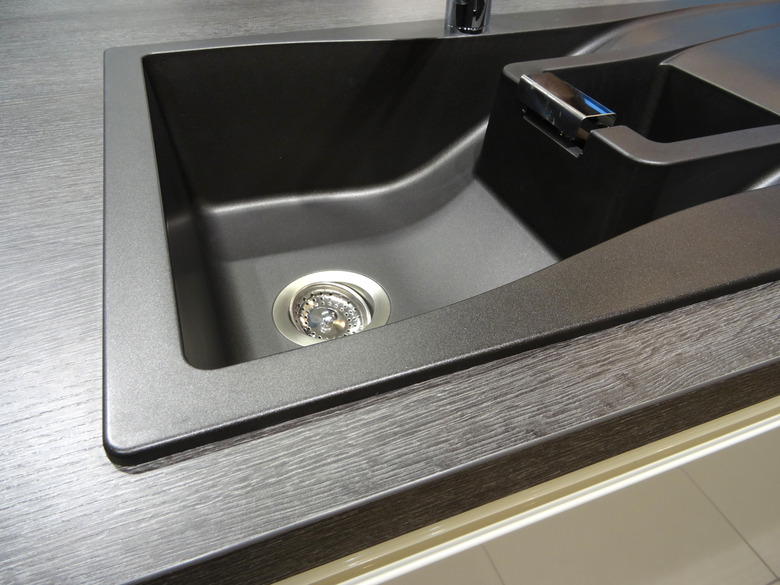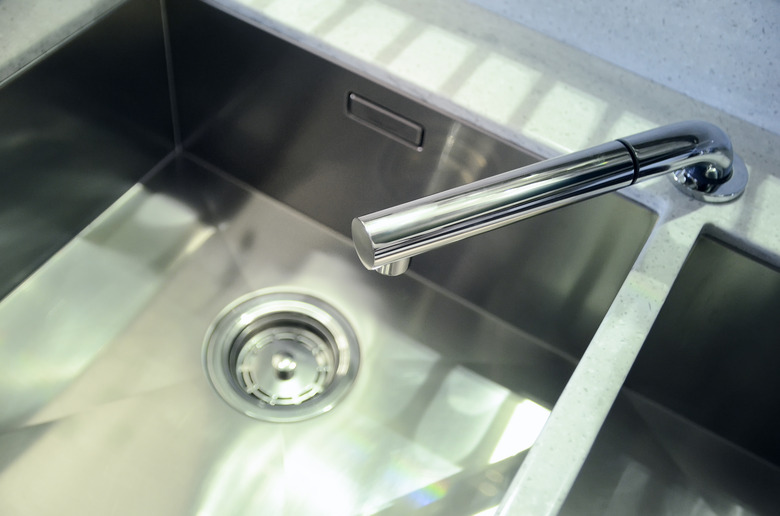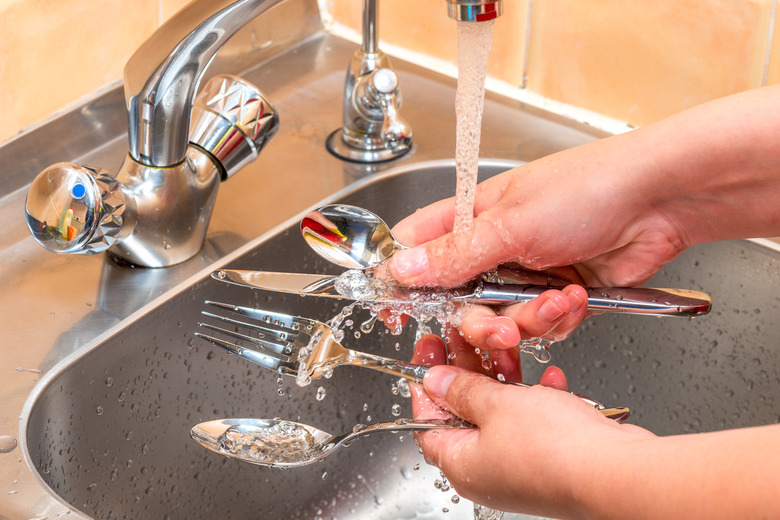Composite Sinks Vs. Stainless Steel
While just about any sink available in a home-improvement store does its job well, all sinks are not created equally. The sink's composition affects its ability to resist stains and heat. The hardness also matters, in terms of noise and whether fragile dishes or glassware may shatter if accidentally dropped in the sink. Both composite and stainless steel sinks are designed for durability and cost effectiveness, but this is where their similarities end.
Composite Basics
Composite Basics
A composite sink, as the name implies, contains a combination of materials. Generally speaking, the term is used to refer to materials that are a combination of acrylic resins and pulverized mineral content—usually quartz, granite, or both. Sometimes composite sinks are called "granite sinks," but this is somewhat misleading, since these are not honed as a solid piece from solid quarried granite. Instead, many so-called granite sinks are actually a composite of granite and quartz powder and acrylic resins molded into a sink shape, sometimes integrated with the countertop. This type of composite sink may carry the label "granite," "composite granite," or "composite quartz," depending on the manufacurer and the nature of the composite material.
The look of a composite sink is quite uniform and doesn't quite look like natural stone. If you aren't sure which material is which when shopping for a sink, ask the representative if the sinks are cut from stone or if they're really a blend of materials containing real stone. The price of the sink is also an indicator. A solid granite sink costs significantly more than a composite sink, since it's much more difficult to obtain, cut and and polish large hunks of granite into a sink shape.
Composite Sinks: The Pros
Composite Sinks: The Pros
- Composite sinks are an excellent choice for a modern color scheme in a kitchen. Since composites are a blend of materials, it's easy to find an option in a color that suits your kitchen, as is the case when choosing a synthetic solid-surface countertop.
- A composite sink is very hard, which also means it's extremely durable and unlikely to chip, dent or scratch.
- Composite sinks are also heat resistant and less expensive than real granite.
- In most cases, cleaning a composite sink requires only dish soap, water and a nylon scrub pad.
Price point: Double-bowl composite kitchen sinks range from $200 to $500, on average. Those with a high percentage of quartz powder tend to be cheaper than those with a high ratio of mineral granite.
Composite Sinks: The Cons
Composite Sinks: The Cons
- While less expensive than solid granite, the average composite sink costs more than a similar sink in stainless steel, although the prices aren't extremely different in many cases. Expect to pay several hundred dollars, at least, for a decent composite sink.
- Even though heat-resistant, composite granite isn't heat-proof. Some composite granite sinks may warp from extreme heat, such as when a hot pan is placed directly in a dry sink. Read the specs for any brand you are considering, as the heat resistance and durability varies from one composition to the next.
- Composite sinks are also heavy, much like real stone. They may require added support when installed, compared to a lightweight stainless sink.
- A composite sink is also so hard that dishes and glassware may break if accidentally dropped in the sink. Although it isn't likely, some composite sinks can even crack from the impact of heavy items, such as a large pot full of water.
- Harsh chemicals and abrasive scrub pads can also damage the look of the sink. Even caustic drain cleaners can harm the sink bowl. As with just about any sink material, metal items such as food cans left in the sink can leave temporary rust spots on the composite material.
- Composite granite also doesn't look like exactly like real granite, so if you're trying to save money and match your sink to a granite countertop, a composite won't be a perfect match.
Stainless Steel Sinks: The Pros
Stainless Steel Sinks: The Pros
- Stainless steel is an excellent option for a sink material because it is relatively inexpensive and easy to maintain. It's heatproof for typical kitchen use and "heals" itself when its stainless surface is compromised due to a scratch or slice.
- Items dropped in a stainless sink are less likely to break, compared to a composite or pure stone sink, since the steel is thinner and flexes a bit when necessary.
- A stainless steel sink is often easier to install than stone and composite versions, since stainless weighs so much less. This could mean a better price if hiring a contractor to install the sink.
- Stainless steel sinks are more readily available than composite granite sinks and in a variety of thicknesses that suit just about any budget. At the extreme low end on the price scale, a double-bowl stainless kitchen sink can cost less than $100.
Price point: Expect to pay up to $300 for a decent double-bowl stainless sink, although ultra deluxe models can cost significantly more.
Stainless Steel: The Cons
Stainless Steel: The Cons
- Stainless steel comes in only one color, so it may not be the ideal choice if you're designing a kitchen for a specific theme or look.
- Since stainless steel is a thin metal, it can also be a bit noisy when items are moved around in it, such as while washing dishes.
- Extremely thin, cheap stainless sinks can sometimes be dented from abuse.
- Metal scrub pads can scratch and damage the stainless finish, or even leave behind bits of metal shavings that cause rust. In most cases, stainless heals itself of minor scratches thanks to its composition.
- Stainless steel isn't truly stain-proof. It does resist stains quite well, but items that rust in the sink will leave spots behind. In most cases, stains such as turmeric spots from food are only temporary. Mineral deposits from water also leave visible spots in the sink, but these are easily remedied with vinegar.
References
- Better Homes & Gardens: Buyer's Guide to Composite Granite Sinks
- Premier Surfaces: Pros and Cons of Granite Composite Sinks
- Signature Hardware: What is Granite Composite?
- Quality Bath: Granite Sinks: Everything You Need to Know
- Ship It Appliances: Stainless Steel Vs. Composite Sinks
- University of Auckland: Geology: Hardness
- Franke: Granite: The Jewel in Your Kitchen



